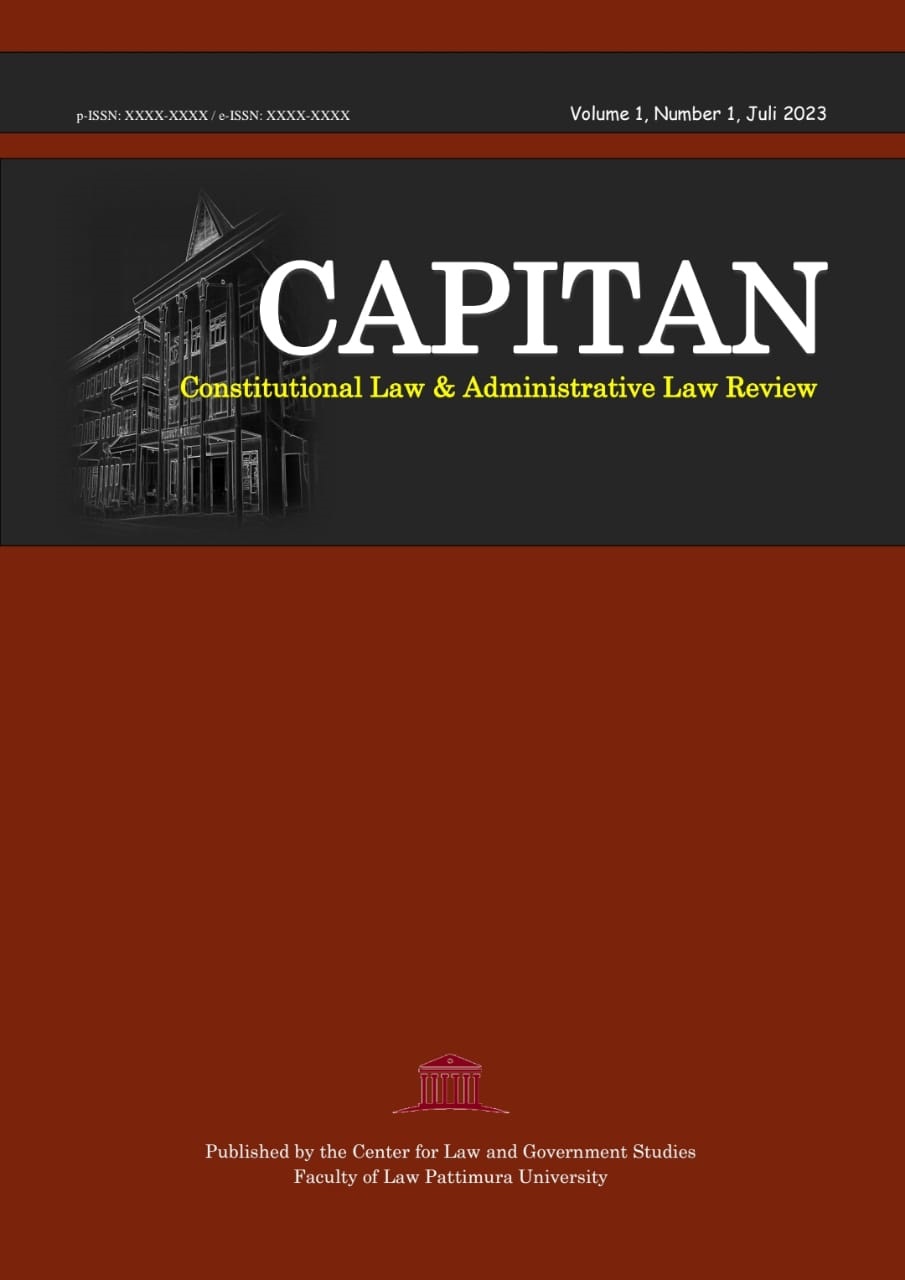Tanggung Jawab Pemerintah Daerah Maluku Tengah Dalam Melaksanakan Penetapan Hutan Adat
Abstract
Forests have a very important position in indigenous communities because forests are a place of residence for the community, providing a livelihood for the community. The problem of ownership of customary land rights or customary forests is one of the main causes of forestry conflicts in Indonesia. Conflicts over recognition of customary land rights holders are very detrimental to indigenous communities. Conflicts that often occur are the uncertainty of the status of customary community rights in forest areas and the unclear boundaries of forest areas. Conflicts over ownership of these rights often put indigenous communities in a weak position. Most cases of conflict in customary forest areas have not been resolved properly to date. Based on the provisions of Law No. 23 of 2013 which is the legal basis for granting authority to the government in determining customary law communities to customary forests through regional regulations, the regional government, more precisely the Central Maluku regional government, has not carried out its responsibilities in terms of determining customary forests, because until now the Central Maluku regional government has not ratified regional regulations regarding the determination of customary law communities, the requirement for determining customary forests is customary law communities, and this recognition is stated in regional regulations which are the responsibility of the regional government.
Downloads
References
Agussalim Andi Gadjong, Pemerintahan Daerah, Kajian Politik Dan Hukum, Bogor: Ghalia Indonesia, 2007.
Elizabetha, Martin ed., ell., A Dictionary of Law, New York: Oxford University Press, 2002.
Eric Stenly Holle, Pengusahaan Sumber Daya Hutan Untuk Kesejahteraan Masyarakat Hukum Adat, Makassar: Disertasi, Program Doktor Ilmu Hukum Universitas Hasanuddin, 2021.
Fahmi Amrusi dalam Ni’matull Huda, Hukum Pemerintah Daerah, Bandung: Nusamedia, 2012.
Hans Kelsen, Pengantar Teori Hukum, Bandung: Nusa Media, 1996.
Harsanto Nursandi, Sistem Hukum Indonesia, Jakarta: Universitas Terbuka, 2007.
I Made Pasek Diantha, Metodologi Penelitian Hukum Normatif Dakam Juridiksi Teori Hukum, Jakarta: PT. Kencana, 2007.
Jazim Hamidi, Revolusi Hukum Indonesia: Makna, Kedudukan, dan Implikasi Hukum Naskah Proklamasi 17 Agustus 1945 dalam Sistem Ketatanegaraan RI, Yogyakarta: Konstitusi Press & Citra Media, 2006.
Marwan Mas, Pengantar Ilmu Hukum, Bogor: Ghalia Indonesia, 2003.
Muntoha, Negara Hukum Indonesia Pasca Perubahan UUD 1945, Yogyakarta: Kaukama, 2001.
Oheo K Harris, “Good Governance (Tata Kelola Pemerintahan Yang Baik) Dalam Pemberian Ijin Oleh Pemerintah Daerah Di Bidang Pertambangan”, Jurnal Yuridika, 30, (1), (2015).
Philipus M. H., Perlindungan Hukum bagi Rakyat di Indonesia, Surabaya: Bina Ilmu, 1987.
S.F. Marbun dan Mahfud MD, Pokok-Pokok Hukum Administrasi Negara, Yogyakarta: Liberty, 1987.
Safrin Salam, “Perlindungan Hukum Masyarakat Hukum Adat Atas Hutan Adat”, Jurnal Hukum Novelty, 7, (2), 209–224, (2016).
Yohanes Pattinasarany, Peran Pemerintah Daerah Dalam Penetapan Batas Batas Negeri, Jurnal Sasi, 21, (2), 4247 (2015).
Copyright (c) 2025 Rasyid Hatuluayo, Yohanes Pattinasarany, Erick Stenly Holle (Author)

This work is licensed under a Creative Commons Attribution-NonCommercial 4.0 International License.
Authors who publish their manuscripts in this Journal agree to the following conditions:
- The copyright in each article belongs to the author, as well as the right to patent.
- Authors are able to enter into separate, additional contractual arrangements for the non-exclusive distribution of the journal's published version of the work (e.g., post it to an institutional repository or publish it in a book), with an acknowledgment of its initial publication in this journal.
- Authors are permitted and encouraged to post their work online (e.g., in institutional repositories or on their website) prior to and during the submission process, as it can lead to productive exchanges, as well as earlier and greater citation of published work.
- Authors have the right to self-archiving of the article (Author Self-Archiving Policy)













